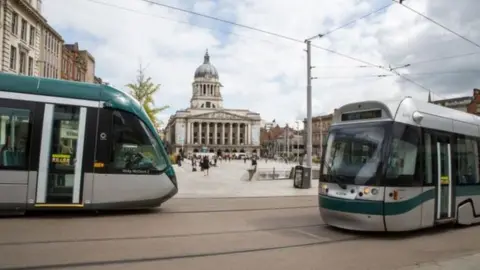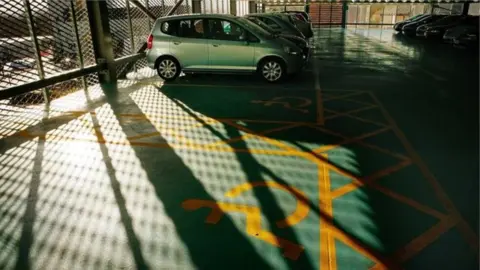Workplace parking tax considered by councils
 Getty Images
Getty ImagesAs budgets are squeezed, many councils are looking at other ways of raising revenue for transport schemes.
This week I went up to Nottingham to see their Workplace Parking Levy (WPL) which has been running since 2012 and it means companies have to pay for car parking spaces.
At the moment they pay £417 per space per year to the council if they have 11 or more.
Eight out of 10 companies pass that onto employees.
In Nottingham the council has used it to pay for a new tram, refurbish a station and introduce cycling schemes.
'Stealth tax'
The council says congestion has not got any worse and air quality has improved plus it makes drivers consider other modes of transport.
In Nottingham, bus and tram use per head is the highest in the country outside London.
Some of the businesses I spoke to though were not happy at having to pay and said they were not getting any benefit from it.
One company, Print 4, is on the outskirts of Nottingham and has to pay £7,000 a year for its parking spaces. It describes the schemes as a "stealth tax".
No business wants extra costs and motoring groups say the WPL is a tax on drivers.
Politicians in Nottingham realised their voters in the centre of town wanted better transport and many of those who drove into the centre were not their voters.
So they changed their policies accordingly.
 Getty Images
Getty ImagesThey also considered a congestion charge, but thought the set up costs were too high.
All of this is interesting because other councils in the South East are now looking at following their example.
Previously, politicians like the Green Mayoral candidate Sian Berry also backed the idea.
She estimated in London the annual income based on 536,000 chargeable spaces would be £670 million.
Hounslow wants to do the same thing on the "Golden Mile" - the Great West Road in Brentford - to get companies to pay for a new Brentford to Southall rail link and a link between Syon Lane and Old Oak Common.
The estimates show that over 25 years if it charged £500 per space it could raise £44m and be operational by 2021.
However, other cities have looked at introducing the WPL with mixed success, Greater Manchester rejected proposals, but the Scottish government looks set to go ahead with its plan after a meeting on Thursday.
How to utilise new funding streams is an emerging theme in transport as money from Central Government shrivels.
The increase in property prices when infrastructure is built is another area some authorities have been looking at.
And charging companies to pay for their parking looks set to spread.
